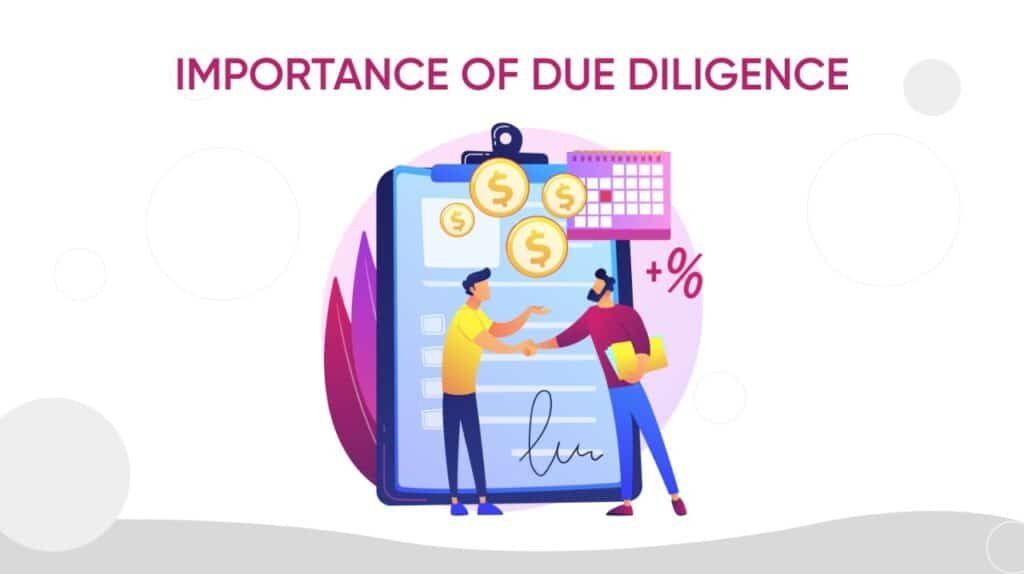What is Due Diligence?
Due diligence is a verification, investigation, or audit of a potential deal or investment opportunity to confirm all relevant facts and financial information and verify. It is completed before a deal closes to assure the buyer of what they’re getting.
When conducting due diligence on a target company, the goal is to thoroughly evaluate its affairs to make an informed decision on whether to proceed with an acquisition. Advance Detective Agency usually prefers a better and deep investigation. They often verify every minute detail.
After completing a preliminary overview investigation of the company and signing a letter of intent or term sheet, it’s time to dig deep into corporate data. This will include finances, sales figures, customer data, ownership of assets, personnel records, and customer data.
Remember that some proprietary information may be staged for later in the due diligence process when the seriousness of your intent warrants it. Transactions that undergo a due diligence process offer higher chances of success. Detective agency in Delhi has adapted to using due diligence whenever necessary.
Due diligence contributes to making informed decisions by enhancing the quality of information available to decision-makers. The Importance of Due Diligence comes from this factor precisely.
Need for Conducting Due Diligence
- Review the company’s business structure and practices
The company’s organizational documents should include articles of incorporation, bylaws, names of board members, board meeting minutes, names of shareholders, a list of all the states and countries where the company does business, and an organization chart. Reviewing corporate records for partnership agreements, vendor and supplier relationships, and deals to purchase securities is also essential.
The data room should include licenses, permits, and letters of consent, as well as articles and press releases about the company.
- Set Up a Virtual Data Room
The best way to thoroughly and efficiently evaluate comprehensive corporate data is to view it in an organized virtual data room that is not only easy to navigate but also completely secure. Suppose due diligence experts can access a central, online document repository that is indexed, fully searchable, and available around the clock. In that case, the transaction is more comprehensive and transparent and dramatically expedites the due diligence process.
As a buyer, this secure access to corporate data streamlines due diligence and reduces the time it takes to make an informed decision. Provide the target company with a due diligence checklist and have them populate the data room in the exact hierarchical structure that best meets your diligence needs.
- Understand Corporate Financials
Your accounting expert will want to see annual reports, tax filings, a profit and loss statement, the general ledger and accounts payable invoices. Accounting will also be interested in a schedule of accounts receivable by category for the latest annual and interim periods and comparable periods, as well as the company’s credit policy and collection procedures.
When performing a more in-depth analysis, your accounting team will also review the company’s latest annual and interim period ageing research and trends, allowing for uncollectible accounts and past write-offs.
- Review Assets & Inventory
Can the target company provide evidence that they own their intellectual property? It’s important not just to verify the ownership, status, and control of the assets but also to determine both the strength and economic value of those assets and the potential infringement liability.
First, your due diligence plan should include reviewing each asset to ensure that all registrations to which the asset is entitled have either been obtained or applied for and are up to date with the relevant filing office.
Ensure that there is a clear, documented chain of title from author or previous owner and that assignment documents are recorded in the public records. You should also check for encumbrances, such as security interests or liens and any contracts granting others the right to use or control IP assets.
Second, never rely solely on the seller’s disclosure of IP assets. It’s also good practice to perform separate searches by “owner” simultaneously as you pull and review the records for the IP assets disclosed by the seller. This process may uncover relevant patent, trademark or copyright applications or registrations that, for whatever reason, were not previously announced.
Your due diligence team should carefully examine trade secret policies and procedures and all agreements to recognize and maintain confidentiality. The team should also investigate the actual physical manner the company uses to handle materials containing trade secrets. Make sure the target company has taken adequate precautions to restrict or prohibit disclosure and use of trade secrets.
Finally, perform a complete inventory and assessment of physical assets. These assets might include real estate, manufacturing equipment, office equipment and supplies, inventory, and raw materials.
- Investigate Outstanding Liabilities
One of the most crucial components of the due diligence process is identifying cases of unresolved litigation. These exposures can be associated with current or past employees, past or present customers, vendors, intellectual property issues and can even be related to company practices that are no longer in use.
Never assume that it’s enough to ask about outstanding litigation issues simply. It’s not uncommon for a thorough due diligence process to reveal litigation exposure of which the owners of the selling company weren’t even aware. Unresolved litigation, exposed late in the due diligence process, is not only more difficult and costly to deal with, but can delay and potentially kill deals.
Types of Due Diligence in Mergers and Acquisition
- Financial due diligence
Financial due diligence is a crucial assessment of the business’s financial health where the company’s historical and current financial performance is scrutinized. It’s aim is to establish future forecasts with any potential risks taken into account.
A key part of financial due diligence is reviewing financial statements, assets, debts, cash flow and projections to determine whether they are true and accurate. This helps the buyer better understand the company’s core performance metrics.
- Legal due diligence
Legal, due diligence is essential to any transaction and a mandatory consideration before entering any merger or acquisition. It is an exercise in risk assessment to investigate any potential liabilities of the target company that could impact a successful transaction.
Legal due diligence will typically include carefully examining all material contracts, including partnership agreements, licensing agreements, guarantees, and loan and bank financing agreements.
- M&A tax due diligence
Tax due diligence is the process of examining all the different taxes applicable to a business, depending on its tax obligations and which jurisdictions it sits within.
Corporate tax due diligence is a review of all the taxes a company is required to pay. It assesses the company’s total tax liability and the level of compliance with tax laws.
This includes the validation of documents like tax returns (usually for the last three to five years), information pertaining to tax audits, and agreements with tax agencies. It aims to ensure all the company’s taxes are being paid and reported.
- Operational due diligence
Operational due diligence covers all a target company’s main operations and considers all of its operational facilities and processes. In M&A transactions, operational due diligence assesses whether operational improvements could create additional value in the transaction, or if there are operational risks that should be addressed.
- Intellectual Property due diligence
IP due diligence is an in-depth assessment of the quantity and quality of a target company’s intellectual property assets. While these assets are intangible, they are often an important contributor to the company’s overall value and something that can set them apart from their competition.
- Commercial due diligence
Commercial due diligence (also called market due diligence) is an important step in validating the opportunity strategically. This process looks at the market size, market share, customer base, competitors and potential future returns. Commercial due diligence aims to assess if the deal is financially viable and the likelihood of realizing value from it. Get a better understanding of commercial due diligence here.
- HR due diligence
HR due diligence is one of the most underestimated and extensive due diligence types. It covers the entire spectrum of the workforce and all documentation pertaining to employees and management.
HR due diligence checks are essential for getting a full picture of the company culture. It can identify any people-based risks before proceeding with a transaction, such as the likelihood of key roles exiting the business.
HR due diligence covers employee contracts, salaries, benefits and bonuses, as well as any problems or grievances. All HR policies and procedures are also carefully analysed.
- Regulatory due diligence
Regulatory due diligence is becoming increasingly important for ensuring compliance amid a changing regulatory landscape. It’s crucial that companies undertake regulatory due diligence to identify areas of legal or regulatory risk that usually have a zero tolerance policy.
- Environmental due diligence
Environmental regulation is important for a company to demonstrate, as risk of non-compliance can lead to heavy penalties and even operational shut down. Environmental due diligence is how companies review all environmental permits, licenses, and methods of disposal to ensure all regulations are being followed.
- Power due diligence with AI
The above overview of due diligence types might give you the impression that there’s a lot of work to be done – and there is. One of the ways that Ansarada can help you make these processes as efficient and secure as possible is with a suite of AI-powered deal tools.
Ansarada’s AI tools can analyze the real-time flow of data from interactions between bidding parties in a deal, including huge volumes of information. This enables dealmakers to garner value from tens of thousands of data points in seconds. They can also automate hours of manual work to save significant time and cost in efficiency alone.
Indeed, the term commercial advantage is equally important as due diligence of prospective contracts is done to ensure that a particular party is not getting the Short End of the Stick or, in other words, is not being cheated by the other party.
Apart from the legal vetting, most parties to commercial contracts often do transactional and economic due diligence wherein they study the prospective deal from the point of view of whether it would benefit them both in the shorter and longer terms.
Mergers and acquisitions by businesses are often put through the due diligence process wherein the firm considering the acquisition of another company often checks to see if the terms and conditions of the proposed merger are favourable to it.



